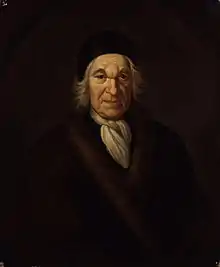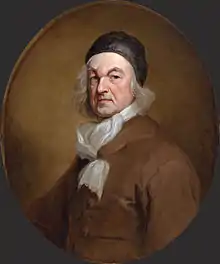Charles de Saint-Évremond
Charles de Marguetel de Saint-Denis, seigneur de Saint-Évremond (1 April 1613 – 29 September 1703) was a French soldier, hedonist, essayist and literary critic. After 1661, he lived in exile, mainly in England, as a consequence of his attack on French policy at the time of the Peace of the Pyrenees (1659). He is buried in Poets' Corner, Westminster. He wrote for his friends and did not intend his work to be published, although a few of his pieces were leaked in his lifetime. The first full collection of his works was published in London in 1705, after his death.
Charles de Saint-Évremond | |
|---|---|
 Portrait of Charles de Saint-Évremond by Jacques Parmentier, circa 1701 | |
| Born | 1 April 1613 Saint-Denis-le-Guast, near Coutances, in Normandy, France |
| Died | 29 September 1703 (aged 90) London, England |
| Occupation | Essayist, critic, soldier |
| Nationality | French |
Life
He was born at Saint-Denis-le-Guast, near Coutances, the seat of his family in Normandy. He was a pupil of the Jesuits at the College de Clermont (now Lycée Louis-le-Grand), Paris; then a student at Caen. For a time he studied law in Paris at the College d'Harcourt (now Lycée Saint-Louis). He soon, however, took to arms, and in 1629 went with Marshal Bassompierre to Italy. He served through great part of the Thirty Years' War, distinguishing himself at the siege of Landrecies (1637), when he was made captain. During his campaigns he studied the works of Montaigne and the Spanish and Italian languages.[1]
In 1639 he met Gassendi in Paris, and became one of his disciples. He was present at the battles of Rocroi, Nördlingen, and at Lerida. For a time he was personally attached to Condé, but offended him by a satirical remark and was deprived of his command in the prince's guards in 1648. During the Fronde, Saint-Évremond was a steady royalist. The duke of Candale (of whom he has left a very severe portrait) gave a command in Guienne to Saint-Évremond, who had reached the grade of maréchal de camp. He is said to have pocketed 50,000 livres in less than three years from this office. He was one of the numerous victims involved in the fall of Fouquet in 1661. His letter to Marshal Créqui on the Treaty of the Pyrenees, which is said to have been discovered by Colbert's agents at the seizure of Fouquet's papers, seems a very inadequate cause for his disgrace.[1]
Saint-Évremond fled to the Netherlands and to England, where he was kindly received by Charles II and was pensioned. After James II's flight to France, Saint-Évremond was invited to return, but he declined. Hortense Mancini, the most attractive of Cardinal Mazarin's group of attractive nieces, came to England in 1670, and set up a salon for love-making, gambling, and witty conversation, and here Saint-Évremond was for many years at home. He died aged ninety on 29 September 1703 and was buried in Westminster Abbey, where his monument still is in Poets' Corner, close to that of Prior.[1]
Literary work
| French literature |
|---|
| by category |
| French literary history |
| French writers |
|
| Portals |
|

Saint-Évremond never authorised the printing of any of his works during his lifetime, though Barbin in 1668 published an unauthorised collection. But he empowered Des Maizeaux to publish his works after his death, and they were published in London (2 vols., 1705), and often reprinted. His masterpiece in irony is the so-called Conversation du maréchal d'Hocquincourt avec le père Canaye (the latter a Jesuit and Saint-Évremond's master at school), which has been frequently classed with the Lettres provinciales.[1]
His Œuvres meslées, edited from the manuscripts by Silvestre and Des Maizeaux, were printed by Jacob Tonson (London, 1705, 2 vols.; 2nd ed., 3 vols., 1709), with a notice by Des Maizeaux. His correspondence with Ninon de l'Enclos, whose fast friend he was, was published in 1752; La Comédie des académistes, written in 1643, was printed in 1650. Modern editions of his works are by Hippeau (Paris, 1852), C Giraud (Paris, 1865), and a selection (1881) with a notice by M. de Lescure.[1] Among his plays is one called Politick Would-be, modelled on a character from Ben Jonson's Volpone.
Partial bibliography
- Œuvres mêlées (1643–1692),
- Les Académistes (1650)
- Retraite de M. le duc de Longueville en Normandie
- Lettre au marquis de Créqui sur la paix des Pyrénées (1659)
- Conversation du maréchal d’Hocquincourt avec le Père Canaye
- Réflexions sur les divers génies du peuple romain (1663)
- Seconde partie des œuvres meslées (1668),
- Sur nos comédies
- De quelques livres espagnols, italiens et français
- Réflexions sur la tragédie ancienne et moderne
- Défense de quelques pièces de Corneille
- Parallèle de M. le Prince et de M. de Turenne
- Discours sur Épicure
- Pensées sur l’honnêteté
- Considérations sur Hannibal
- Jugement sur Tacite et Salluste
- L’idée de la femme qui ne se trouve point
- Jugement sur les sciences où peut s’appliquer un honnête homme
- Dissertation sur la tragédie d’Alexandre
- Fragment d’une lettre écrite de La Haye
- De la seconde guerre punique
- De l’éloquence, tirée de Pétrone
- La matrone d’Éphèse
Publications
- Les Opéra, Éd. Robert Finch et Eugène Joliat, Genève, Droz, 1979.
- Œuvres en prose, Éd. René Ternois, Paris, Didier, 1962.
- La Comédie des académistes, Éd. Louis d'Espinay Ételan, Paolo Carile et al., Paris, Nizet, 1976.
- Entretiens sur toutes choses, Éd. David Bensoussan, Paris, Desjonquères, 1998. ISBN 2-84321-010-0
- Écrits philosophiques, Éd. Jean-Pierre Jackson, Paris, Alive, 1996. ISBN 2-911737-01-6
- Réflexions sur les divers génies du peuple romain dans les divers temps de la république, Napoli, Jovene, 1982.
- Conversations et autres écrits philosophiques, Paris, Aveline, 1926.
- Lettres, Éd. intro. René Ternois, Paris, Didier, 1967.
- Maximes et œuvres diverses, Paris, Éditions du Monde Moderne, 1900–1965.
- Pensées d’Épicure précédées d'un Essai sur la morale d’Épicure, Paris, Payot 1900.
Notes
-
 One or more of the preceding sentences incorporates text from a publication now in the public domain: Chisholm, Hugh, ed. (1911). "Saint-Évremond, Charles de Marguetel de Saint-Denis, Seigneur de". Encyclopædia Britannica. 24 (11th ed.). Cambridge University Press. p. 1.
One or more of the preceding sentences incorporates text from a publication now in the public domain: Chisholm, Hugh, ed. (1911). "Saint-Évremond, Charles de Marguetel de Saint-Denis, Seigneur de". Encyclopædia Britannica. 24 (11th ed.). Cambridge University Press. p. 1.
References
| Wikisource has original works written by or about: Charles de Saint-Évremond |
Online
- http://frenchphilosophes.weebly.com/saint-evremond.html
- Discours sur Épicure. Paris: Claude Barbin, 1684.
- Œuvres meslées de M. D. *** de S. Évremont. Paris: Claude Barbin, 1693.
- Œuvres meslées Tome I. Paris: Claude Barbin, 1670.
- Œuvres meslées Tome II. Paris: Claude Barbin, 1671.
- Œuvres meslées Tome III. missing.
- Œuvres meslées Tome IV. Paris: Claude Barbin, 1681.
- Œuvres meslées Tome V. Paris, Claude Barbin, 1678.
- Œuvres meslées Tome VI. Paris: Claude Barbin, [1683].
- Œuvres meslées Tome VII. Paris: Claude Barbin, 1684.
- Œuvres meslées Tome VIII. Paris: Claude Barbin, 1684.
- Œuvres meslées Tome IX. Paris: Claude Barbin, 1684.
- Œuvres meslées Tome X. Paris: Claude Barbin, 1684.
- Œuvres meslées Tome XI. Paris: Claude Barbin, 1684.
- Les Académiciens : comédie. Paris: Charavay frères, 1879.
Print
- Antoine Adam, Les libertins au XVIIe, Paris, Buchet/Chastel 1964
- Patrick Andrivet, Saint-Évremond et l'histoire romaine, Orléans, Paradigme, 1998 ISBN 2-86878-184-5
- H.T. Barnwell, Les idées morales et critiques de Saint-Évremond : essai d'analyse explicative, Paris, PUF, 1957
- Patrice Bouysse, Essai sur la jeunesse d'un moraliste : Saint-Évremond (1614–1661), Seattle, Papers on French Seventeenth Century Literature, 1987
- Gustave Cohen, Le séjour de Saint-Évremond en Hollande, Paris, Champion, 1926
- Walter Daniels, Melville Saint-Évremond en Angleterre, Versailles, L. Luce, 1907
- Soûad Guellouz, Entre baroque et lumières : Saint-Évremond (1614–1703) : colloque de Cerisy-la-Salle (25–27 septembre 1998), Caen : Presses universitaires de Caen, 2000 ISBN 2-84133-111-3
- Suzanne Guellouz, Saint-Évremond au miroir du temps : actes du colloque du tricentenaire de sa mort, Caen – Saint-Lô (9-11 octobre 2003), Tübingen, Narr, 2005 ISBN 3-8233-6115-5
- Célestin Hippeau, Les écrivains normands au XVIIe : Du Perron, Malherbe, Bois-Robert, Sarasin, P. Du Bosc, Saint-Évremond, Genève, Slatkine Reprints, 1970
- Mario Paul Lafargue, Saint-Évremond ; ou, Le Pétrone du XVIIe, Paris, Société d'éditions extérieures et coloniales, 1945
- Gustave Merlet Saint-Évremond : étude historique morale et littéraire; suivie de fragments en vers et en prose, Paris, A. Sauton, 1870
- (in Italian) Luigi de Nardis, Il cortegiano e l’eroe, studio su Saint-Évremond, Firenze, La Nuova Italia Editrice, 1964
- Léon Petit, La Fontaine et Évremond : ou, La tentation de l'Angleterre, Toulouse, Privat, 1953
- Jacques Prévot, Libertins du XVIIe, v. 2, Paris, Gallimard, 1998–2004 ISBN 2-07-011569-0
- Gottlob Reinhardt, Saint-Évremonds Urteile und Gedanken üer die alten Griechen und Römer, Saalfeld am Saale, 1900
- Leonard Rosmarin, Saint-Évremond : artiste de l'euphorie, Birmingham, Summa Publications, 1987 ISBN 0-917786-52-1
- Albert-Marie Schmidt, Saint-Évremond ; ou, L'humaniste impur, Paris, Éditions du Cavalier, 1932
- K. Spalatin, Saint-Évremond, Zagreb, Thèse de doctorat de l’Université de Zagreb, 1934
- Claude Taittinger, Saint-Évremond, ou, Le bon usage des plaisirs, Paris, Perrin, 1990 ISBN 2-262-00765-9